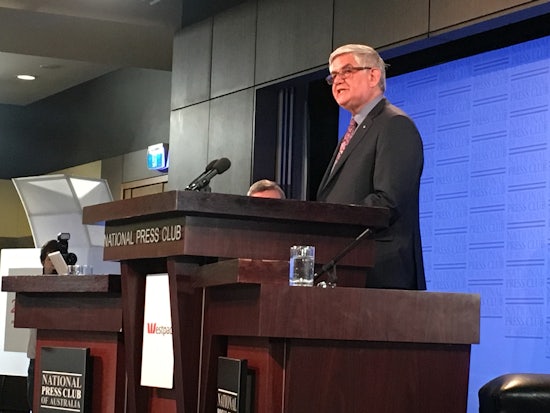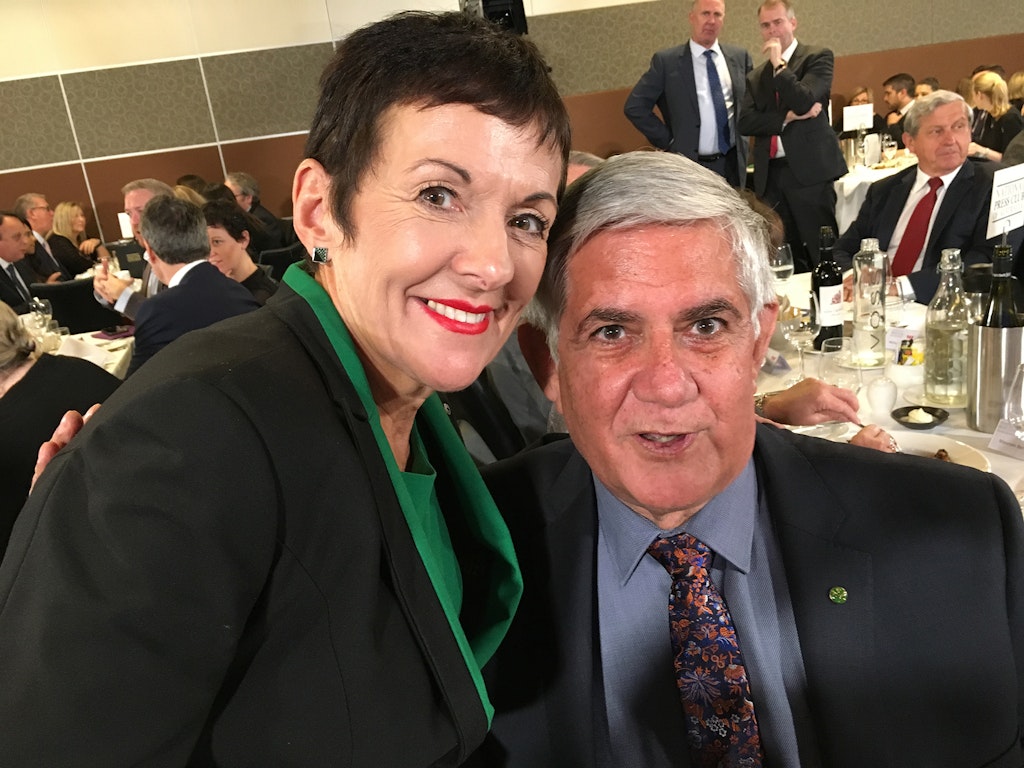Unannounced accreditations part of Aged Care Quality Review release
Unannounced accreditation visits are one of the key recommendations to come out of last week’s release of the much anticipated Review of National Aged Care Quality Regulatory Processes at the National Press Club in Canberra.

Minister for Aged Care Ken Wyatt addressing and releasing the Review of National Aged Care Quality Regulatory Processes at the National Press Club in Canberra (Source: Minister’s Office)
The review, ordered earlier this year by Minister for Aged Care Ken Wyatt after the Oakden failures, was conducted by Kate Carnell and Professor Ron Paterson and puts forward 10 key recommendations.
Of the key recommendations noted in the review, recommendation eight – which calls for ‘ongoing accreditation, with unannounced visits, to assure safety and quality of residential aged care’ – is one Minister Wyatt says will be implemented by Government as soon as possible.
“I have carefully considered the Carnell/Paterson Review of National Aged Care Quality Regulatory Processes, that I ordered after the shocking revelations about the Oakden mental health aged care residence in South Australia,” he says.
“It is appalling that anyone could be treated so badly, and that this mistreatment was not detected earlier.
“Elder abuse is unacceptable, and will only be stamped out when it is confronted and corrected, and the Turnbull Government is now leading a national agenda to address this.
“Government will move as soon as possible to implement unannounced assessment visits across residential aged care facilities, to help ensure safe, quality care standards are maintained at all times.
“Aged care safety and quality are non-negotiable and must be delivered to residents 365 days of the year, without exception.”
While the review was implemented as a result of the Oakden scandal, Minister Wyatt says there have been other high-profile aged care failures which have ‘highlighted where parts of our system have sadly let us down’.
“The overwhelming majority of facilities provide excellent care and are working to continually improve services, but our focus must be on those that are not delivering,” he explains.
“The old process of notifying providers ahead of subsequent re-accreditation reviews will go, replaced by comprehensive unannounced visits conducted over at least two days.
“Our commitment to this will be relentless, on behalf of all senior Australians, who deserve nothing but the best of care.
“Expectations of the aged care sector are understandably high – because all of us want our family members and ourselves to be treated with nothing but dignity and respect.
“All Australians have inherent rights, built on a foundation of dignity which should not in any way diminish with age.”
While noting there are changes that need to be made and announcing that he will ‘consider the review in detail’, Minister Wyatt says the Australian aged care system is one can be built on.
“Despite the challenges and the changes required, we have a ‘bloody good’ aged care system to build on and we should celebrate this in so many ways,” he says.
“In the end, how we consider and care for our elders is the ultimate reflection on ourselves.”

The Chief Executive Officers (CEOs) of three of Australia’s aged care industry peak bodies have shared their group alliance with the Minister in working on the proposed reforms.
Sean Rooney, CEO of Leading Age Services Australia (LASA); Pat Sparrow, CEO Aged and Community Services Australia (ACSA); and CEO of the Aged Care Guild Cameron O’Reilly say a strong aged care sector is sought by all.
“Government, providers and the community all share a desire for a strong aged care sector, supported by an accreditation system that protects consumers’ safety and upholds the standards the community rightfully expects when it comes to quality of care,” the three CEOs say.
“Our commitment to ensuring that outcome is emphatic and we will work with the government to support initiatives that are effective in reaching this end.”
CEO for leading aged care consumer advocacy body Council on the Ageing (COTA) Ian Yates has also welcomed the key recommendations outlined in the review.
“COTA support the recommendations to increase the number and scope of unannounced visits to aged care facilities which should occur no less than once a year,” he says.
“We welcome the greater focus on consumer rights and the recommendation that one in five nursing home residents be engaged as part of that accreditation process.
“The Carnell/Paterson Report contains bold but realistic recommendations to strengthen and sharpen accreditation and complaints processes so that aged care providers uphold their obligation to provide the highest quality of care the community expect and pay for.”
The full list of recommendations released with the review include:
-
Establish an independent Aged Care Quality and Safety Commission to centralise accreditation, compliance and complaints handling
-
The Aged Care Commission will develop and manage a centralised database for real-time information sharing
-
All residential aged care services in receipt of Commonwealth funding must participate in the National Quality Indicators Program
-
The Aged Care Commission will implement a star-rated system for public reporting of provider performance
-
The Aged Care Commission will support consumers and their representatives to exercise their rights
-
Enact a serious incident response scheme (SIRS) for aged care
-
Aged care standards will limit the use of restrictive practices in residential aged care
-
Ongoing accreditation, with unannounced visits, to assure safety and quality of residential aged care
-
Ensure that assessment against Standards is consistent, objective and reflective of current expectations of care
-
Enhance complaints handling






















